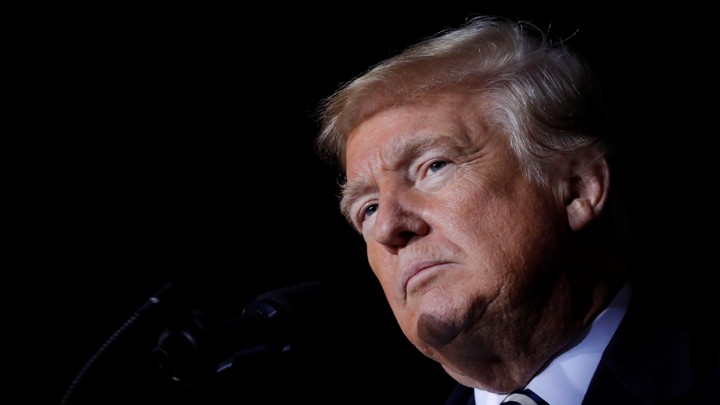Trump Bet Conservatives Wouldn't Denounce His Racist Ad. He Won.
In the Trump era, when every day brings fresh insanity, looking back is hard. But it’s worth remembering what Donald Trump did in the final days before Tuesday’s midterm elections. It’s worth remembering because it’s a template for what he may do in 2020. And for how mainstream conservatives will respond.
According to CNN, Republican officials wanted to close the campaign with an upbeat “Morning in America”–style commercial touting the country’s strong economy. Trump disagreed. He demanded that Republicans end by demonizing immigrants. On October 31—six days before the midterms and four days after a man enraged by Jewish support for the immigrant caravan murdered 11 people in Pittsburgh—Trump tweeted out an ad about the caravan. When Paul Ryan called him the Sunday before Election Day to implore him to talk about the economy, Trump instead boasted that his focus on immigration was rousing the GOP base.
He was probably right. Trump does appear to have incited Republican fury over immigration, which likely helped the GOP match the Democrats’ high turnout. His strategy worked, in part, because he understood something about the respectable people in his party: They wouldn’t challenge his bigotry, no matter how blatant it was.
Bigotry involves ascribing negative characteristics to an entire racial, religious, or ethnic group. Trump’s caravan ad does that emphatically. It’s built around the stereotype—which has been repeatedly debunked—that undocumented Latino immigrants are disproportionately violent. As William Saletan has noted in Slate, it begins with a man declaring, in a heavy Spanish accent, that he wants to kill police. If his ethnicity isn’t clear enough, the ad gives his name—Luis Bracamontes—and says he “killed our people!” It later features an interview with a man who says in Spanish, according to an interpreter, that he wants to come to the United States to seek a pardon for attempted murder. The ad also shows what appears to be a Nicaraguan flag, and a mass of people violently pushing against a fence.
Even Fox eventually rejected the ad. But that didn’t significantly undermine conservative unity because respectable conservatives—the kind who initially shunned Trump—bent themselves into pretzels trying to deny the obvious. The day after Trump released the commercial, Robert VerBruggen, a deputy managing editor of National Review, noted that it had “produced comparisons to the Willie Horton ad and accusations of racism … despite the fact that the criminal featured is, uh, rather pale.” VerBruggen’s claim was that the ad couldn’t be racist because Latinos are sometimes described as white. This is semantic nonsense. Whether or not Latinos constitute a “race,” they’re a distinct group. Their distinctiveness is highlighted in Trump’s ad, which emphasizes Bracamontes’s accent and name. So whether or not Trump’s ad is “racist” toward Latinos, it is clearly bigoted.
On November 2, the National Review editor Rich Lowry weighed in. “I looked up Luis Bracamonte [sic], who is featured in the Trump ad that Robert mentioned. His case doesn’t implicate Democrats in particular the way the video says. But he is the worst of the worst, a vicious and unrepentant killer.” The implication is that because Bracamontes really is a remorseless murderer, there’s nothing wrong with targeting him in an ad. This is staggeringly naive. Does Lowry think that Trump—who during his 2016 campaign called Mexican immigrants “rapists” and said that a Mexican American judge couldn’t be impartial—chose a Mexican murderer by accident?
Finally, on that same day, National Review’s Ramesh Ponnuru gently took issue with VerBruggen. “What I think he overlooks,” Ponnuru wrote, “is that the controversy over the ad isn’t coming out of a clear blue sky. The president has a history on race, and the ad can reasonably be viewed in the context of it.” Even Ponnuru, however, wouldn’t come out and call Trump’s ad bigoted.
But if National Review’s response to Trump’s ad was tepid and evasive, it was nothing compared with the response of Erick Erickson, another formerly anti-Trump conservative respectable enough to be invited on Meet the Press. “I don’t actually think it is racist,” Erickson tweeted. “I think it is a terrible ad, but calling it racist doesn’t make it so. It’s just a really bad and poorly executed ad. Yes, it plays on fear, but I don’t think it plays to racist sentiments per se.”
Erickson, you’ll notice, makes no argument and cites no evidence. He just says again and again that the ad isn’t racist. The Washington-based former news anchor Derek McGinty then tweeted a question: “Reminds me very much of Willie Horton. Do you think that was racist?” Erickson answered: “No I didn’t, but then I was 12. I think it stoked people’s fears about crime at the time, not so much about Horton’s race.” McGinty probed further: “Would the ad have been as effective if Horton wasn’t a ‘scary Black’ man?” At which point Erickson conceded: “That’s a fair point.” And then claimed that the first person to use Willie Horton was Al Gore.
Let’s summarize the exchange. First, Erickson insists, with no evidence, that the caravan ad isn’t racist. Then he insists, again with no evidence, that the Willie Horton ad isn’t racist either. Then, when gently challenged, he acknowledges that maybe the Horton ad is racist, but still doesn’t acknowledge that the caravan ad is. Why not? Who knows?
What makes all this so depressing is that National Review and Erick Erickson once actually did challenge Trump. In January 2016, with Trump already the GOP presidential front-runner, National Review’s editors called him a “philosophically unmoored political opportunist” with “strong-man overtones” who was “not deserving of conservative support.” In August 2015, Erickson disinvited Trump from a conference he had organized because of Trump’s sexist and insulting comments about Megyn Kelly. It was easier back then; Trump hadn’t yet taken over the Republican Party. But their actions also reflected the fact that Erickson and National Review take conservatism seriously. At times in the past, they’ve tried to remain true to their vision of it, even when doing so put them at odds with the GOP.
In the final days before the midterm, however, they weren’t willing to challenge their readers. They couldn’t clearly admit that Trump was peddling racism because that would have required them to repudiate him. But neither could they muster serious arguments for why the ad wasn’t racist. So they half-heartedly waved the whole thing away.
Which is just what Trump expects. Bullies can sense cowardice. The lesson he’ll take away is that next time he can go even further—secure in the knowledge that respectable conservatives will avert their eyes and go along for the ride.
We want to hear what you think about this article. Submit a letter to the editor or write to letters@theatlantic.com.
PETER BEINART is a contributing editor at The Atlantic and an associate professor of journalism and political science at the City University of New York.


No comments:
Post a Comment